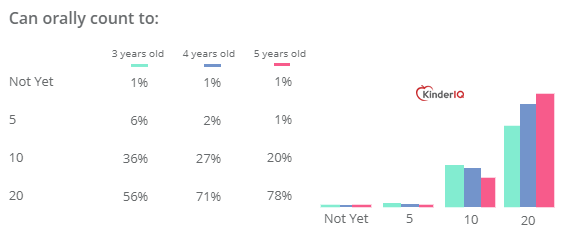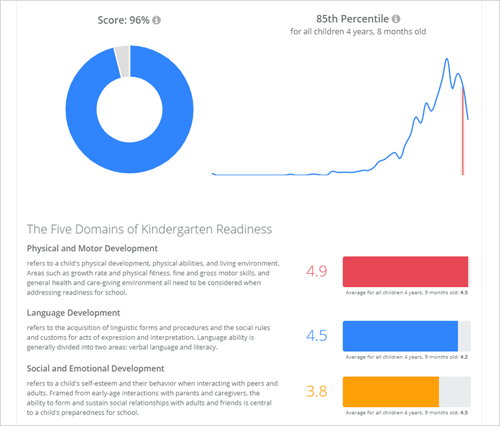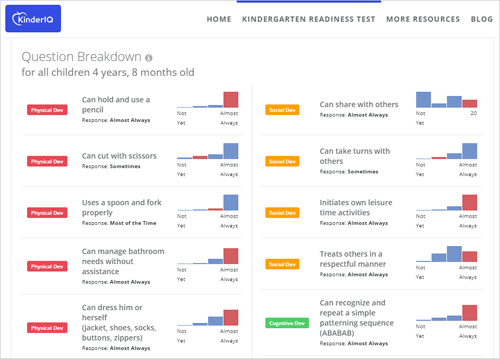10 Things Children Should Learn in Kindergarten
The kindergarten year is packed with activities and lessons that children absorb in order to be successful throughout their entire school career. Today's kindergartners are expected to begin the year ready and willing to learn. By the end of the year, here are 10 areas teachers are hoping new first graders have a handle on.


 Utilize our research-based approach to get real data regarding school readiness and focused learning.
Utilize our research-based approach to get real data regarding school readiness and focused learning.
 KinderIQ can show how your responses compare to thousands of other children across the country of the same age.
KinderIQ can show how your responses compare to thousands of other children across the country of the same age.
 Want more details on what kindergartners can expect in the first year of school? Take a look at our detailed Core Kindergarten Curriculum.
The KinderIQ free Kindergarten Readiness Test features dozens of online questions to help you assess your child's readiness for school and allows you to compare your responses to thousand of other parents so you know where to focus future learning activities.
Give it a try and begin mastering early learning fundamentals today.
Want more details on what kindergartners can expect in the first year of school? Take a look at our detailed Core Kindergarten Curriculum.
The KinderIQ free Kindergarten Readiness Test features dozens of online questions to help you assess your child's readiness for school and allows you to compare your responses to thousand of other parents so you know where to focus future learning activities.
Give it a try and begin mastering early learning fundamentals today.

Classroom Behavior
Kindergarten students learn to sit quietly while their teacher reads a story or provides instruction and to follow basic directions. They also learn, if they haven't yet, the importance of sharing, as well as how to manage conflict with their peers.Recognize Short Words
Not all kindergartners are reading by the end of the school year, but they may recognize a handful of simple two and three-letter words by sight - it also helps to be able to recognize their name in print. Practice with our Sight Words For Preschool and Kindergarten list.Reading Skills
Fluent reading is not a priority for kindergartners, but the fundamentals are put in place during this school year. Students will learn letter sounds, phonemic awareness, word families, and begin to recognize rhyming words.Counting
Kindergartners will spend this year practicing counting to 100 and to recognizing numbers in print, even when out of order. Based on data from thousands of KinderIQ parents, we know that children rapidly improve their ability to orally count to 20 between the ages of 3 and 5 years old.
Math Fundamentals
Strong fundamentals in math are important for success throughout a school career, and that starts in kindergarten. Children learn to sort and group objects by color, size and shape, as well as to recognize similarities and differences in objects to help with sorting, counting, and simple addition and subtraction.Printing
Students will spend the year learning to print the alphabet, both capital and lowercase. They will also learn how to print their name, numbers up to 20 and some short sight-words. Printing not only helps strengthen reading concepts, but helps students develop their fine motor skills. Try our Premium Kindergarten Worksheets Collection for over 50 downloadable skills worksheets to help with tons of early learning topics including printing letters and numbers.Early Social Studies
Young learners are often excited to talk about themselves, and teachers may use this enthusiasm to help students recite their phone number, address and other personal information. As the year progresses, students hear about the world beyond themselves, learning about different types of families, communities, the significance of various holidays, and other basics of social studies.Healthy Habits
New students will learn the basics of healthy lifestyle habits, such as dental health, the importance of good hygiene and how healthy foods help our bodies work better.Early Science
Kindergartners learn science basics by regularly observing and recording the weather, planting seeds and watching them grow, and other hands-on activities that help provide a better understanding of the physical sciences.Time Concepts
Kindergartners will learn how to look at a calendar and recognize what day, week and month it is, as well as how days build into weeks and weeks into months. KinderIQ can show how your responses compare to thousands of other children across the country of the same age.
KinderIQ can show how your responses compare to thousands of other children across the country of the same age.
 Want more details on what kindergartners can expect in the first year of school? Take a look at our detailed Core Kindergarten Curriculum.
The KinderIQ free Kindergarten Readiness Test features dozens of online questions to help you assess your child's readiness for school and allows you to compare your responses to thousand of other parents so you know where to focus future learning activities.
Give it a try and begin mastering early learning fundamentals today.
Want more details on what kindergartners can expect in the first year of school? Take a look at our detailed Core Kindergarten Curriculum.
The KinderIQ free Kindergarten Readiness Test features dozens of online questions to help you assess your child's readiness for school and allows you to compare your responses to thousand of other parents so you know where to focus future learning activities.
Give it a try and begin mastering early learning fundamentals today.